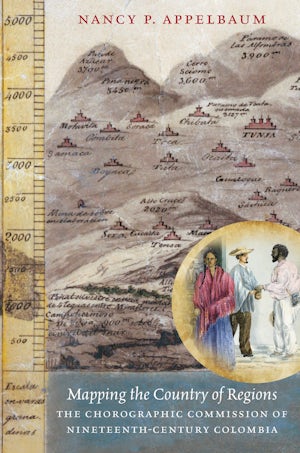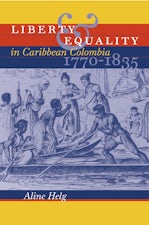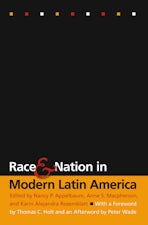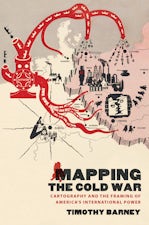Mapping the Country of Regions
The Chorographic Commission of Nineteenth-Century Colombia
By Nancy P. Appelbaum
320 pp., 6.125 x 9.25, 38 figs, notes, bibl., index
-
Paperback ISBN: 978-1-4696-2744-1
Published: May 2016 -
Hardcover ISBN: 978-1-4696-2893-6
Published: May 2016 -
E-book EPUB ISBN: 978-1-4696-2745-8
Published: May 2016 -
E-book PDF ISBN: 979-8-8908-4916-8
Published: May 2016
Buy this Book
- Paperback $39.95
- Hardcover $99.00
- E-Book $0.00
For Professors:
Free E-Exam Copies
Awards & distinctions
Ibero-American Prize for an Academic Book on the Nineteenth Century, Nineteenth Century Section of the Latin American Studies Association
Honorable Mention, Marysa Navarro Best Book, New England Council on Latin American Studies
What jumps out of the commission's array of reports, maps, sketches, and paintings is a portentous tension between the marked differences that appeared before the eyes of the geographers in the field and the visions of sameness to which they aspired. The commissioners and their patrons believed that a prosperous republic required a unified and racially homogeneous population, but the commission's maps and images paradoxically emphasized diversity and helped create a "country of regions." By privileging the whiter inhabitants of the cool Andean highlands over those of the boiling tropical lowlands, the commission left a lasting but problematic legacy for today's Colombians.
Open Access ebook sponsored by an award from the National Endowment for the Humanities Fellowships Open Book Program.
About the Author
Nancy P. Appelbaum, professor of history at Binghamton University, The State University of New York, is co-editor of Race and Nation in Modern Latin America and author of Muddied Waters: Race, Region, and Local History in Colombia, 1846-1948.
For more information about Nancy P. Appelbaum, visit
the
Author
Page.
Reviews
“A truly compelling work that provides an important understanding of Colombian culture and history. Highly recommended.”--CHOICE
“Provides a lens through which we can observe the mechanics of national formation in nineteenth-century Colombia through the analysis of the Chorographic Commission’s visual and textual materials.”--Journal of Historical Geography
“A welcome addition to the English-language history of nineteenth-century Colombia, contributing to the history of its science and providing a counterpoint to works that tend to focus on divisions seen principally from a single region.”--Hispanic American Historical Review
“Appelbaum’s study deepens our understanding of the work of the Chorographic Commission and the role of geographic science in the project of Colombian nationhood.”--H-Net Reviews
“An enormous achievement.”--Latin American Research Review
"This insightful and ground-breaking book shows the multiple contradictions and paradoxes of mid-nineteenth-century nation building in Colombia, in particular, and in the Americas, more generally. Mapping the Country of Regions takes us a step closer to understanding the phenomenon of regionalism as an intermediate step in the creation of nations."--Jorge Cañizares-Esguerra, University of Texas at Austin




